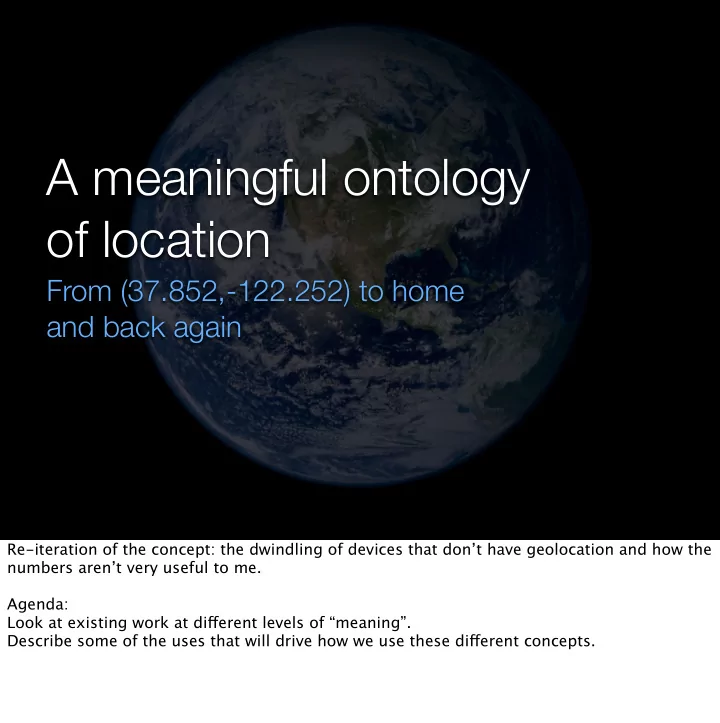

A meaningful ontology of location From (37.852,-122.252) to home and back again Re-iteration of the concept: the dwindling of devices that don’t have geolocation and how the numbers aren’t very useful to me. Agenda: Look at existing work at di fg erent levels of “meaning”. Describe some of the uses that will drive how we use these di fg erent concepts.
Neogeography Personal data Military and political Light-weight tools Traditional GIS tools Good enough Precise Neogeographers as opposed to, jokingly, paleogeographers. Di fg erences are not well-defined (besides age), but: I’m coming from the Neogeography side, both since that’s my background and since I’m focused on the personal data aspect, but I’ll try to integrate some “paleo” concepts.
The current state of location on the Web: lat/lon W3C Geolocation GeoRSS geo: URI scheme Geo microformat iPhone CoreLocation Win7 Location Platform
The current state of location on the Web: lat/lon Why? Unambiguous Convenient for data storage No interoperability problems Obvious how to use it Not actually unambiguous (World Geodetic System 1984) but in mailing list discussions, often neogeographers don’t even realize it could be ambiguous.
Are coordinates meaningful? Personal ontology At home In Berkeley, in California, Geographic ontology near San Francisco Named location / 3141 College Ave, Berkeley civic address Latitude/longitude (37.852,-122.252) Are they meaningful? Di fg erent levels of meaning which I’ll roughly sketch out here. But keep in mind that this ordering of meaning bottom to top might be reversed depending on your point of view.
Gazetteers “Vocabulary control is the sine qua non of information organization.” – Elaine Svenonius United Nations Conferences on the Standardization of Geographical Names (UNCSGN) ISO 3166 GeoNames Geocoding & reverse-geocoding We talked last week about these large books of geographic names for atlases along with coordinates. Sometimes we just need to specify the spelling (vocabulary control): a big issue in the developing world like Thailand. A more recently developed tool is GeoNames: an open gazetteer with millions of names. And Yahoo!/Google/etc. provide Geocoding/Reverse-geocoding services to translate between coordinates and these names.
Gazetteers? Games, and how they work. Useful for self-reflection. Are these gazetteers as well? In a way, they’re building up their own list of authoritative named locations which is one of their main challenges and their main outputs, despite being a game.
Geographic ontologies What is an ontology? I assume that most of us have an idea of what “ontology” means in the information organization context, but just to re-cap (and from a philosophical bent): an ontology is a way of dividing up the world (or a particular domain) into di fg erent types and describing the relationship between those types. In geography, this is pretty clear, cities are parts of states are parts of countries. But also, I can be within this zipcode which borders other zipcodes, but also within this county which borders other counties. Not all geographic ontologies are straightforward -- neighborhoods and the like have fuzzy borders and di fg erent meanings to di fg erent people.
Where-on-Earth IDs (WOEIDs) Hierarchy of official and informal places Relationships to neighbors, parents, children Freely available for download and web services Useful for Geographic Information Retrieval: expanding queries
Personal ontologies At home, at school, at work On Bart, on the bus, on a plane With my co-workers, my friends, my family Where we first met, where I was at this time yesterday
Use cases self-reflection sharing and privacy contextual triggers
Next steps Matching up use cases to those di fg erent levels of meaning What features does an ontology need to support these? As a final project, build a version of this ontology, and services to contribute and consume
Questions? npdoty@ischool.berkeley.edu http://npdoty.name
Recommend
More recommend